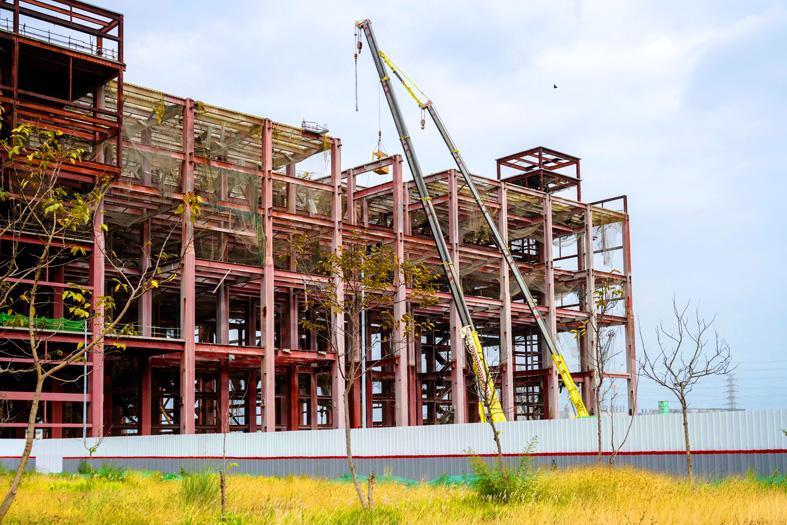US President Biden’s top economic and national security advisers are today to host more than a dozen chief executive officers to discuss the administration’s US$2.25 trillion infrastructure plan and the global semiconductor shortage, a White House official said.
US National Economic Council Director Brian Deese and US National Security Adviser Jake Sullivan are to host the meeting, while US Secretary of Commerce Gina Raimondo is also to participate.
Companies invited to join the administration officials include General Motors Co, Ford Motor Co, Stellantis NV, Google’s parent company Alphabet Inc, Dell Technologies Inc, Intel Corp, Medtronic PLC, Northrop Grumman Corp, HP Inc, Cummins Inc, Micron Technology Inc, Taiwan Semiconductor Manufacturing Co (TSMC, 台積電), AT&T Inc and Samsung Electronics Co.

Photo: Bloomberg
A White House official said that the agenda would include proposals in what Biden calls the “American Jobs Plan” to support the auto industry’s transition to clean energy, the creation of jobs and the preservation of US economic competitiveness.
“The president is deeply committed to ending the silos between domestic and foreign policy — and the semiconductor shortage is a perfect example of an urgent economic and national security priority for the Biden administration,” Sullivan said in a statement. “The shortage is impacting the lives of American workers and families as plants sit idled. And trying to address supply chains on a crisis-by-crisis basis creates critical national security vulnerabilities.”
The Biden administration is in the middle of a 100-day supply-chain review — including for semiconductors — and has called on the US Congress to pass legislation that would fund chips research and development.
The results of the review are not to be made public until June and today’s meeting is to inform the outcome, White House press secretary Jen Psaki said on Thursday last week.
Intel, Samsung and TSMC have all announced plans to build factories in the US, although none of the companies has started construction and the timeline for production at the new plants would potentially be years away.
Deese said that the COVID-19 pandemic exposed economic vulnerabilities, as well as the importance of robust and reliable supply chains.
“This summit reflects the urgent need to strengthen critical supply chains and strategically position the US economy to lead the 21st century, and we look forward to partnering with our key stakeholders in this effort,” he said in a statement.
TSMC told the Central News Agency on Saturday that it planned to join the meeting, although it did not say which executive would attend.
TSMC on Friday posted a record NT$362.41 billion (US$12.76 billion) in revenue in the first quarter, up 16.7 percent from a year earlier.
The company is to hold an investors’ conference on Thursday to detail its first-quarter financial results, as well as its forecast for the rest of this year, and progress on planned chip fabs in Arizona and Japan.
Additional reporting by CNA

In Italy’s storied gold-making hubs, jewelers are reworking their designs to trim gold content as they race to blunt the effect of record prices and appeal to shoppers watching their budgets. Gold prices hit a record high on Thursday, surging near US$5,600 an ounce, more than double a year ago as geopolitical concerns and jitters over trade pushed investors toward the safe-haven asset. The rally is putting undue pressure on small artisans as they face mounting demands from customers, including international brands, to produce cheaper items, from signature pieces to wedding rings, according to interviews with four independent jewelers in Italy’s main

Japanese Prime Minister Sanae Takaichi has talked up the benefits of a weaker yen in a campaign speech, adopting a tone at odds with her finance ministry, which has refused to rule out any options to counter excessive foreign exchange volatility. Takaichi later softened her stance, saying she did not have a preference for the yen’s direction. “People say the weak yen is bad right now, but for export industries, it’s a major opportunity,” Takaichi said on Saturday at a rally for Liberal Democratic Party candidate Daishiro Yamagiwa in Kanagawa Prefecture ahead of a snap election on Sunday. “Whether it’s selling food or

CONCERNS: Tech companies investing in AI businesses that purchase their products have raised questions among investors that they are artificially propping up demand Nvidia Corp chief executive officer Jensen Huang (黃仁勳) on Saturday said that the company would be participating in OpenAI’s latest funding round, describing it as potentially “the largest investment we’ve ever made.” “We will invest a great deal of money,” Huang told reporters while visiting Taipei. “I believe in OpenAI. The work that they do is incredible. They’re one of the most consequential companies of our time.” Huang did not say exactly how much Nvidia might contribute, but described the investment as “huge.” “Let Sam announce how much he’s going to raise — it’s for him to decide,” Huang said, referring to OpenAI

The global server market is expected to grow 12.8 percent annually this year, with artificial intelligence (AI) servers projected to account for 16.5 percent, driven by continued investment in AI infrastructure by major cloud service providers (CSPs), market researcher TrendForce Corp (集邦科技) said yesterday. Global AI server shipments this year are expected to increase 28 percent year-on-year to more than 2.7 million units, driven by sustained demand from CSPs and government sovereign cloud projects, TrendForce analyst Frank Kung (龔明德) told the Taipei Times. Demand for GPU-based AI servers, including Nvidia Corp’s GB and Vera Rubin rack systems, is expected to remain high,